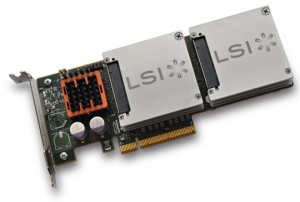 LSI yesterday announced a portfolio of NAND flash-based PCIe cards aimed at accelerating application performance in servers and storage area networks connected to the servers.
LSI yesterday announced a portfolio of NAND flash-based PCIe cards aimed at accelerating application performance in servers and storage area networks connected to the servers.
LSI’s new Nytro line encompasses three product lines aimed at high-end, mid-range and low-end applications.
The new Nytro WarpDrive, LSI’s new high-end product, is the second generation of its WarpDrive NAND flash card. The PCIe card comes with NAND flash capacities ranging from 200GB to 3.2TB. The card can be ordered with single-level cell (SLC) or multi-level cell (MLC) NAND. The card is intended to be used as a primary storage medium for application servers.
LSI’s midrange card, the Nytro XD, combines the Nytro WarpDrive with new XD intelligent caching software, which allows the server using the card to also detect the hottest data on external storage, such as a SAN, and cache it to the NAND flash. The Nytro XD is qualified to work with SAS, Fibre Channel or iSCSI-based SANs.
The third product line, the Nytro MegaRAID, is a PCIe card that combines a small amount of NAND flash with an industry standard MegaRAID controller. The card provides application acceleration for SAS connected storage, as well as RAID protection.
LSI also announced its Nytro Predictor Software, a free tool that when downloaded onto a server analyzes workloads in order to determine how much an application will benefit from LSI’s PCIe cards.
All three new Nytro cards are the first to use SandForce’s flash controller chips since LSI purchased the company last year. The Nytro line is as much a strategy change as it is a new product line, according to Jamon Bowen, LSI’s principal technical marketing manager.
The Nytro WarpDrive is intended for use in high-performance computing environments, online transaction processing web serving, data analytics and warehousing, and data mart and data mining.
The WarpDrive is also aimed at being a primary storage tier within a server. It uses NAND flash chips that are more than a magnitude of order denser than LSI’s previous generation PCIe cards (34 nanometers vs. 50+ nanometer circuitry).
LSI’s previous generation SLP-300 WarpDrive card only offered 300GB of capacity, compared with anywhere from 200GB to 3.2TB of capacity on the Nytro WarpDrive. The Nytro WarpDrive, which uses PCIe Gen.2 electronic signaling, also offers twice the performance of its predecessor.
Bowen said LSI plans on offering a Nytro WarpDrive that uses the PCIe Gen. 3 specification with 4GBps of sustained throughput in the third quarter of this year.
LSI’s midrange card, the Nytro XD, is a caching device for applications data internal to a server as well as external to that box. For example, if a server is attached to DAS or a SAN, it will automatically detect the data requiring the highest throughput and place it on the NAND flash as opposed to internal hard drives.
LSI claims the Nytro XD can improve an iSCSI SAN supporting an Oracle database by as much as 10 times compared with servers using only hard drives. It can also cut down on end-user response time by the same amount.
Previously, LSI offered caching software, called CacheCade, on the RAID card. It’s new Nytro XD ports the software directly onto the server to be used by the operating system.
“By doing that, the caching capability can be extended to external storage without actually touching the array. It’s caching not tiering, so it keeps a copy of the data on the [storage] array,” Jamon said.
The third product, the Nytro MegaRAID, combines less than 100GB of NAND flash with a RAID controller in a sealed unit. It is also a caching device, but it is designed to be simple to implement and is aimed at lower-end applications that don’t require massive amounts of high-performance NAND flash.
“It’s all pre-configured, there’s no software on the host and so it makes it easy for an administrator to set up,” Jamon said.
The Nytro MegaRAID card can increase the number of transactions per second on a SQL server by as much as 10 times over servers with hard drives only and improve response times on an Oracle database by as much as 30 times, according to LSI.
LSI’s Nytro PCIe cards are being tested with with system manufacturers and are expected to be generally available beginning in the second quarter of 2012.
Pricing for Nytro WarpDrive cards starts at $6,600; pricing for Nytro XD solutions start at $9,400; and pricing for Nytro MegaRAID cards starts at $1,699.





